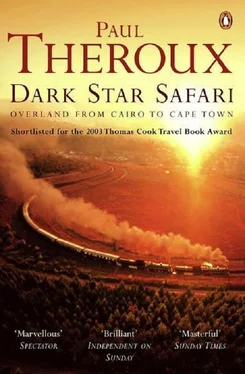What reassured me was the appropriateness of this African imagery in my Egyptian captivity, my prologue waiting for a Sudanese visa, for in that self-conscious mental narrative that serves a writer as a sort of memory gimmick, seeing these features and these faces was just right as an introduction, as grace notes and little pips that would be repeated themes, struck louder as my trip progressed, went deeper, grew denser, got blacker.
Needing to boost my morale with a sense of accomplishment, and to make use of my time in Cairo — Umm al Dunya, Mother of the World — I decided to apply for some other visas. I went to the Uganda Embassy, still with Guda at the wheel, utterly lost in the district of Dokki. ‘I have never taken an American to this embassy!’
But the Ugandan was friendly, Stephen Mushana, a youngish round-faced man in the dusty Second Secretary’s office in Midan El Messaha. He was fluent in Arabic from five years in Cairo. His home village was in a deep valley in craggy southwest Uganda. He was a Mukiga, a member of the Bakiga tribe, whose customs have always fascinated me, their frenzied dances, their ingenious terrace farming, their Urine Ceremony — a promise of polygamy performed by the groom and his brothers that assures that a widow will be guaranteed a husband, one of those surviving brothers.
‘My brother died,’ the Ugandan consul said. ‘But I didn’t have to marry his wife.’ He paused as though wondering how much more information to give me. ‘Well, she died a little while later.’
‘Sorry to hear it.’
‘AIDS is very bad in my country.’
‘It didn’t exist when I lived there.’
‘Maybe it existed but people didn’t know it.’
‘I left there thirty-six years ago.’
‘I was two years old!’
I got this all the time. The average life expectancy in Africa was so short that many diplomats were in their thirties, and some in their twenties, and they had no memory of their country as a big placid republic but only as a nest of problems. I had never seen these places at war; some of them grew up on war — there had been fighting in Uganda from the 1970s onward.
‘It must have been good then.’
‘Very good. Very peaceful.’ And looking back it seemed to me a golden age, and I remembered friends and colleagues.
‘Do you know Aggrey Awori?’
Mushana said, ‘He’s an old man.’
Awori was my age, regarded as a miracle of longevity in an AIDS stricken country; a Harvard graduate, Class of ’63, a track star. Thirty years ago, a rising bureaucrat, friend and confidant of the pugnacious prime minister, Milton Obote, a pompous gap-toothed northerner who had placed his trust in a goofy general named Idi Amin. Awori, powerful then, had been something of a scourge and a nationalist, but he was from a tribe that straddled the Kenyan border, where even the politics overlapped: Awori’s brother was a minister in the Kenyan government.
‘Awori is running for president.’
‘Does he have a chance?’
Mushana shrugged. ‘Museveni will get another term.’
‘I had some good friends — really funny ones. My best friend was a guy called Apolo Nsibambi. We shared an office at the Extra Mural Department at Makerere, and then I got a promotion — became Acting Director — and I was his boss! I used to tease him for calling himself “Doctor” — he had a Ph. D. in political science. I mocked him for wearing a tie and carrying a briefcase and being pompous. I went to his wedding. He came to my wedding. And then I completely lost touch with him. I wonder what happened to him.’
‘Doctor Nsibambi is the Prime Minister of Uganda.’
Perhaps the oldest inhabited street in the high-density city of Cairo, one thousand years of donkey droppings, hawkers’ wagons, barrow boys, veiled women, jostling camels, hand-holding men, and hubble-bubble smokers, among mosques and princes’ palaces, and a bazaar with shops selling trinkets, brass pots and sacks of beans, is Bayna al-Qasrayn, Between Two Palaces.
Through the lovely door of the mosque I could see the faithful at prayer in the posture of submission, kneeling, bowing low, forehead bumping the carpet, like a dog hugging a football.
Raymond Stock, biographer of Naguib Mahfouz, was my guide once again. He said, ‘All the goods and the glory that were the lifeblood of the great city, al-Qahirah’ — Cairo — ‘the Victorious.’
By chance I had bumped into Raymond at the Semiramis Hotel one afternoon. He was sitting with a big pink-cheeked man, very elegant in a pin-striped suit and silk tie, a matching silk hanky in his breast pocket.
‘He is the son of the Khedive!’ Raymond said, telling me his name. ‘He is a prince!’
The face of the big pink-cheeked man grew rosier and princelier at the mention of his pedigree, Turkish rather than Arab, with a dash of snobbery, for the Khedives were giggly Anglophiles.
‘His family used to run Egypt!’
The big pink-cheeked man fluffed his silk hanky and tut-tutted. The last Khedive, an Ottoman relic, was seen in Cairo in 1914, dumped by the British when Egypt became a British Protectorate.
‘Paul’s a writer,’ Raymond said.
The big pink-cheeked pin-striped prince smiled at my safari jacket and baggy pants and scuffed shoes.
‘I’ve just come from the Sudanese Embassy,’ I said, explaining the dust. ‘They’re renovating.’
‘Paul’s going to Africa,’ Raymond said.
‘People keep saying that, but isn’t this Africa?’
The prince’s chubby cheeks went pinker and pinker with mirth. He didn’t say much but he had a way of glowing that took the place of conversation. He finished his meal, dabbed at his lips, and left, murmuring a farewell in French.
‘Son of the Khedive!’ Raymond said.
I had last seen Raymond six years ago, when I had been traveling around the shores of the Mediterranean on my Pillars of Hercules trip and had docked in Alexandria, having sailed from Istanbul in a Turkish cruise ship, with 450 Turks, my genial mess-mates, Fikret, General Salih, and Onan among them.
Then, May 1994, Naguib Mahfouz had been in intensive care, after being stabbed in the neck by an Islamic zealot. Mahfouz was not expected to recover; yet he had, his stab wounds had healed, he coped with the nerve damage, he was back from the brink — had even resumed writing.
‘Naguib-bey shows up some nights around Cairo. He has a sort of salon,’ Raymond said. ‘I could show you where he was born and grew up.’
That was how it happened that we were strolling down Palace Walk, in the district of Gamaliyeh, which means ‘Place of Beauty,’ a noisy cluttered and crowded suburb, though its inaccurate name was part of its charm, like calling a frozen waste Greenland or a garbage truck a honey wagon.
But the people are the interest now, not the littered streets and alleys.
We went to Judge’s House Square, Midan Bayt al-Qadi, to see some beat-up and dusty trees, ‘Pasha’s beard’ trees — named for the furry shape of their blossoms, the Indian walnut, the scrupulous Raymond Stock informed me, Albizia lebbek . The center-piece of ‘this complex compact and nearly self-enclosed world.’
In the square, we passed the mosque school of Al-Mithqal (‘The Sequinned One’ — a sort of Ottoman Sparkle Plenty), Harat Qirmiz (Crimson Alley) to house number eight, Mahfouz’s childhood home. He was born in this ancient tenement with its tall cracked edifice and named after the doctor who delivered him on 10 December 1911, and growing up in that house (‘He used to stare out of that window’), he wrote about his early passions — for a certain revolutionary, and Charlie Chaplin, and a neighborhood girl whom he idolized.
‘Harat Qirmiz has a high stone wall,’ Mahfouz wrote in Raymond’s translation.
Читать дальше












